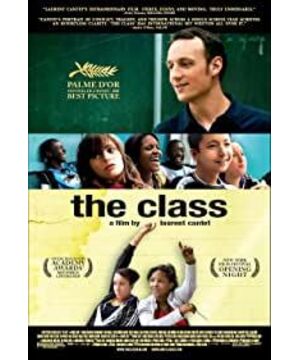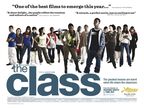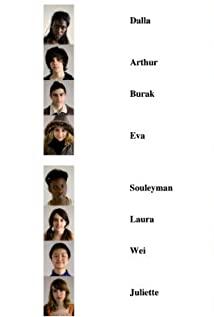Due to geographical factors, China established a unified, centralized and royal state very early, and the assimilation and integration of ethnic groups has also existed for a long time. Moreover, there are relatively few issues with religious beliefs and race. Therefore, regardless of external factors, overall, China is quite stable in this regard.
However, in this semi-realistic French classroom, the situation is quite different. (It is not clear whether it is representative) There are Chinese students, descendants of former French colonies, Caribbean immigrants, Arabs, and of course French. Chinese students are well-respected, well-behaved, quiet and disciplined, and have good grades, and their parents are simple and honest. The student from an Islamic country still seemed to be a little bit unable to integrate into the local culture, and contradicted the reality of the hope of being assimilated as soon as possible. People of African or American descent are in diverse situations. If you look at it as a whole, it may be said that they are still attached to their hometown in some respects, but on the other hand they have developed a self-identity with France. However, it is generally manifested that it may be due to the sensitivity, restlessness and suspicion of birth and social status, so they do not believe in learning and do not respect others. As for the locals, as the majority, they are not presented as one of the subjects of cultural conflict, but they are more or less concerned with the self rather than others. This is very different from the opinions of immigrants or descendants of immigrants who tend to stay together for warmth or care about others. In addition, it is worth noting that while expressing cultural conflicts, the film does not involve ethnic issues, nor does it dwell too much on values. It is simply observing the living conditions of people of different cultures in the same place. This is very good.
As mentioned earlier, because there is no personal experience, it is relatively difficult to talk about cultural conflicts, and I am more interested in this movie, which is the relationship between teachers and students, although it may not have much to do with this movie.
The role of François teacher is a very common positive role. Caring for students, enthusiastic about education, and agreeing to encourage and tolerate students rather than punish them. As usual, there will be teachers who can't control students, and teachers who insist on defending discipline and punishing them seriously. These two conflicting views leave imaginable space in the movie. I dropped out of school, but I didn't say whether I was going back to Mali. Encouraging tolerance is of course important, but serious discipline is not only responsible for teaching to other students, but also to let them know that there are rules in society. There is no capital willfulness except for having the right to be rich, or letting it go. The salary received by the teacher is not high enough to fly, where is there so much thought to change the wind and rain with you. Because of this, the teachers' discussions about the price increase of coffee are more enthusiastic than how to manage students.
There are more and more bear kids now, and it's not easy to teach or manage. Although the ones I have seen are insignificant compared to the movies, there are still a lot of people who make trouble and talk back unreasonably. There have been endless discussions about how teachers punish students, and it is difficult to have a recognized degree of operability. The corporal punishment of students is abhorrent, but overcorrecting is hard for the teacher and some of the classmates. Of course, the educational philosophy in Europe and the United States is very different from that in China, so in terms of personal experience, the effects of classes with foreign teachers are often not as good as expected. However, I think the common bottom line is mutual respect. Speaking like nonsense, disturbing others, and doing things in the classroom should all be punished. However, the punishment of young students is also an embarrassing situation. First, it cannot be resolved through financial relationships like a social person, and second, it is difficult to have substantive behavior given the status of a minor.
Very subjective and impulsively speaking, many times I really want to slap a few people. I thought I was shenmegui. Pull a woolen thread.
Finally, returning to the movie itself, the director used a semi-documentary approach. The scenarios are mostly assumed to be in a classroom or a conference room. It does not highlight a character to lead the story or highlight the theme. There is no drama in the plot. It's very simple and describes the story of a class in a down-to-earth manner. What is presented is the status quo of French education governed by conflicts between different cultures. Of course the director is still positive about this. It can be seen from the quiet release between the teacher and the girl student, that the teacher and student playing together in the end is also proof. However, there is also a drawback in this. The director actually did not express any practical views, nor did he intend to guide the audience to think deeply. Basically, the scene is mainly presented to the audience. In this way, it seems to me that it does not meet the standards of a good movie. So why the TV station does not produce a multi-episode documentary, the impact is not greater.
View more about The Class reviews










